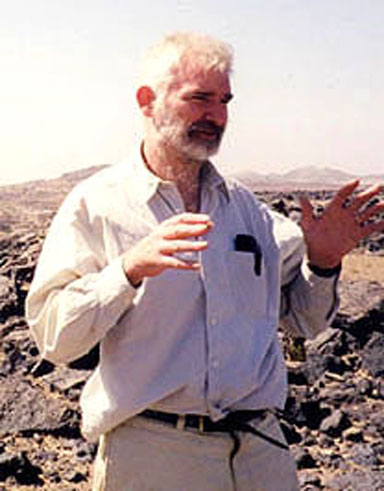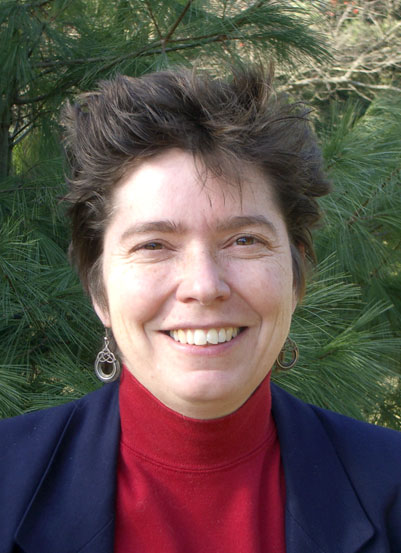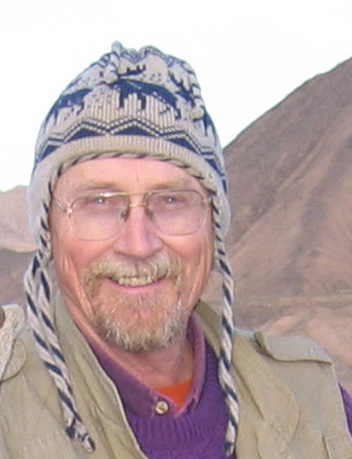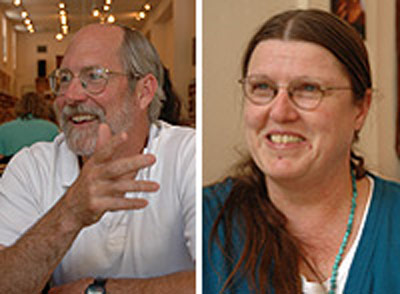2005-2006
Landscapes and Migration
This lectureship addresses ways people use landscapes, create cities, build empires, and migrate from one continent to another. We begin on October 27 with Tony James Wilkinson’s evaluation of ancient urban landscapes in the Middle East. This region where cities first occurred is the subject of new research and significant reevaluations. In early December Susan E. Alcock speaks about the more recent classical world of Roman civilization in the larger Mediterranean basin. In early March and April the lectures address migration to the Americas. David B. Madsen begins in March with the debate about the earliest human migrants from the perspective of east Asia during the last glacial. In April the lectureship concludes with a joint presentation by Terry L. Jones and Kathryn A. Klar. They speak about the great Polynesian seafarers and new evidence from linguistics and archaeology about their likely pre-Columbian landfalls on the Pacific coast of southern California and South America.
October 27, 2005

Tony James Wilkinson, MSc
Professor of Archaeology, Edinburgh, Scotland, University of Missouri-Columbia
Lecture:
Middle East Ancient Urban Landscapes
Giffels Auditorium
6:30 p.m.
Tony James Wilkinson is a senior archaeologist who has mentored faculty and students over a wide ranging career in the United Kingdom, the United States and the Middle East. His research investigates transformations in ancient settlement and land use, agricultural economies, and the emergence of complex societies in the context of a dynamic environment. Current projects in Syria, Turkey, Iran, and Yemen integrate archaeological and landscape surveys with historical records and paleo-environmental data to explore human-environment relationships, demographic trends, and the development of cities in the ancient Middle East. Wilkinson received his undergraduate degree from Birkbeck College, London University in 1969 and completed graduate work in 1972 at McMaster University, Hamilton, Ontario. He served as Assistant Director, British Archaeological Expedition to Iraq, Baghdad from 1989 to early in 1992 and then as a Senior Research Associate at the Oriental Institute, University of Chicago until 2003. He is currently a Professor of Archaeology at the University of Edinburgh, Scotland. Over the past fifteen years Wilkinson has published dozens of articles and four books, including the highly-acclaimed work, Archaeological Landscapes of the Near East, and has received numerous research grants from The National Geographic Society and the National Science Foundation.
December 1, 2005

Susan E. Alcock, Ph.D.
John H. D’Arms Collegiate Professor of Classical Archaeology and Classics, Department of Classical Studies, The University of Michigan
Lecture:
No greater marvel: archaeology and the prehistoric landscapes of the Roman East
Giffels Auditorium, Old Main
6:30 p.m.
Susan E. Alcock received an award of $500,000 in 2000 from the John D. and Catherine T. MacArthur Foundation, one of the largest private philanthropic foundations in the United States. Her MacArthur fellowship concludes next year. Alcock specializes in Greek and Roman archaeology and is an engaging speaker. She is described accurately as “an intellectual dynamo who is forging exciting new paths in the field of Roman archaeology.” And whose work addresses “the intersection of social history and archaeology.” Her undergraduate degree in 1983 from Yale University was followed by the Ph.D. in 1989 from the University of Cambridge. Since then, Alcock authored, co-authored and edited nine books about the Roman and Greek worlds; among these is Archaeologies of the Greek Past: Landscape, Monuments and Memories. She is preparing three others under book contracts, and is negotiating for a fourth about Roman art and archaeology. In 2004, she received the Spiro Kostof Award, Society of Architectural Historians. Her teaching has been recognized for excellence by the Henry Russell Award from University of Michigan, and an Excellence in Undergraduate Teaching Award from the Archaeological Institute of America.
March 9, 2006

David B. Madsen, Ph.D.
Research Fellow, Texas Archaeological Research Laboratory, University of Texas-Austin; Research Professor, Director of Environmental Research, Mercyhurst Archaeological Institute, Erie, Pennsylvania
Lecture:
The Peopling of the Americas : Before or After the Last Glacial Maximum
Giffels Auditorium, Old Main
6:30 p.m.
David B. Madsen is a specialist in Quaternary paleoecology; palynology; and evolution of desert environments. His research centers on the arid lands of western China and Tibet along with the Great Basin of North America. Current projects are as varied as these landscapes and include, among others, millennial-scale climate change events in comparative central Asian and western North American lake histories; and peopling of the New World before the last glacial maximum. He is the editor of Entering America: Northeast Asia andBeringia Before the Last Glacial Maximum , the most up-to-date evaluation of how, when and from where this migration occurred. Madsen’s undergraduate degree is from University of Utah ; his doctorate was awarded in 1973 from University of Missouri . He was Utah State Archaeologist from 1973 until 1994, and Head, Paleontology and Paleoecology Program of Utah Geological Survey from 1994 to 1997, when he became its Senior Scientist of Environmental Sciences, a position he held until 2002. Since 2000, he has been Visiting Research Professor, Department of Geography, Lanzhou University , China . Among his latest grants are ones from the National Science Foundation to define hunter-gatherer antecedents in North China and Late Paleolithic-Neolithic transitions in North-Central China. He recently described his language training as: Reading French, some Mandarin, beginning Texan. People naturally look up to Madsen as a towering presence in the debates about the peopling of the Americas , because he never ceases to learn new things, and his engaging sense of humor.
April 6, 2006

Terry L. Jones, Ph.D.
Associate Professor of Anthropology, Department of Social Sciences, California Polytechnic State University, San Luis Obispo, California
Kathryn A. Klar, Ph.D.
Lecturer, Celtic Studies Program, University of California, Berkeley
Lecture:
Linguistic and Archaeological Evidence for Prehistoric Polynesian Contact with Southern
California
Giffels Auditorium, Old Main
7:30 p.m.
Terry L. Jones and Kathryn A. Klar’s collaboration sheds light on a puzzle: did Polynesian before Columbus sail to southern California? Jones’ undergraduate degree in 1978 from University of California Santa Cruz was followed in the 1980s by Masters degrees from Sonoma State University and then University of California , Davis , from which he received his doctorate in 1995. He is the coauthor of Prehistoric California: Archaeology and the Myth of Paradise. Jones is an acknowledged authority on California prehistory and adaptations to coastal, estuary and marine settings. Klar’s undergraduate and graduate degrees in linguistics are from University of California, Berkeley. Her undergraduate degree was awarded in 1971, followed by the M.A. in 1973 and doctorate in 1977. She was awarded a National Science Foundation Graduate Fellowship from 1971 through 1974 . After a Smithsonian Institution Postdoctoral Fellowship, she returned to Berkeley in 1978. Klar has taught in the departments of linguistics and comparative literature before her most recent appointment in 1989 to the Celtic Studies Program. In 2000, she was honored as a Berkeley Language Center Fellow . Klar teaches Welsh, Welsh poetry, and has dealt extensively with Native California languages including Chumash, which is central to hers and Jones’ argument about Polynesian seafarers. She is the coeditor of American Indian and Indo-European Studies: Festschrift in Honor of Madison S. Beeler and A Celtic Florilegium: Studies in Honor of Brendan O Hehir. Among Klar’s current projects is a full-scale intellectual biography of American linguist and ethnologist John P. Harrington.
Acknowledgements
In addition to the Robert L. Stigler, Jr. Trust, the King Fahd Center for Middle East and Islamic Studies, and the family and friends of the late Professor Allen P. McCartney have supported this year’s lectures.